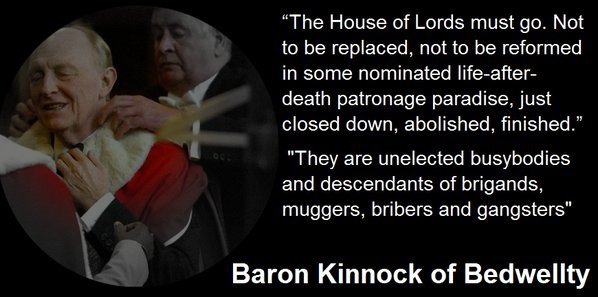The Soft Underbelly of the State: Lords Suspended for Rule Breaches
Westminster’s oldest and most exclusive private members’ club is in trouble again. But let’s be honest, is anyone truly surprised?
The stench of entitlement wafting from the Upper Chamber grew a little stronger this week as two peers were set to be suspended following yet another sordid chapter in Britain’s never-ending cash-for-access saga. It is absolute proof, if any were still needed, that the House of Lords remains an undemocratic relic, tailor-made for influence peddling and elite networking.
Former Chief of the General Staff Lord Richard Dannatt and, shamefully, Labour’s own Lord David Evans of Watford, will be removed from the red benches for four and five months respectively.
Both men were exposed not by the robust checks and balances of Parliament, but by a Guardian undercover investigation. The sting revealed just how effortlessly parts of the Lords drift from “public service” into an old-boys’ consultancy for hire.
“Neither peer bothered to appeal. Why would they? The evidence was caught on camera, exposing the grim reality of how business is done in the corridors of power.”
Lord Dannatt: The “National Interest” Excuse

The Standards Commissioner concluded that Lord Dannatt, a crossbencher, breached the rules repeatedly. He was found to have approached ministers and government officials regarding three companies – UK Nitrogen, Teledyne UK, and Blue International Holdings – all of which he had a financial stake in.
He was caught on film telling undercover reporters that he could make introductions and “get to know” useful ministers. While no cash physically changed hands, the Commissioner found something equally troubling: a clear willingness to provide paid parliamentary services.
In other words, the door was wide open for the highest bidder.
Dannatt attempted to argue he was acting in the “national interest.” It is a tired, arrogant defence often heard from the establishment elite, who seem to believe the “national interest” just so happens to align neatly with the profit margins of the companies paying their dividends.
Lord Evans: Profiteering on the Red Benches

Perhaps even more galling for the Labour movement is the conduct of Lord Evans. The Commissioner found he had sponsored parliamentary events for Affinity, a company owned by his son, and one in which he still held a third of the shares.
Tickets for these events were sold at a price higher than their actual cost, effectively turning the Palace of Westminster, the seat of our democracy, into a venue for commercial gain.
Evans also told undercover reporters he could introduce them to MPs. That alone breaches the fundamental rule that peers must act on personal honour. His defence? He thought his shares had been transferred to his son years ago. In the real world, ignorance of the law is no excuse. In the House of Lords, it is the default setting.
A System Built for Corruption

Both men referred themselves to the Commissioner only after they were caught on camera. That isn’t integrity; it is damage control.
While the House of Lords will likely pat itself on the back for “acting decisively” with these short suspensions, the real problem lies in the foundations of the institution itself. The Lords is the soft underbelly of the British state:
- Stuffed with political donors and failed MPs.
- Completely unaccountable to the British public.
- Operating in a fog of privilege where the line between public interest and private reward is forever blurred.
This scandal is not an aberration; it is the architecture functioning exactly as designed. A hereditary and appointed echo chamber will always attract those seeking influence, contracts, or connections. As long as the Lords exists in its current form, these stories will appear on schedule.
The Betrayal of Reform
Which begs the question: Wasn’t this Labour government supposed to abolish the House of Lords?
Sir Keir Starmer campaigned on a platform of cleaning up politics. We were promised constitutional renewal. We were promised an end to the indefensible system of unelected peers legislating over the people. Yet, here we are, with Labour peers caught in the same trough as the rest of them, and the promise of abolition kicked into the long grass in favour of “tinkering around the edges.”
For now, two peers will temporarily lose their seats. But the rotten system that enabled them remains fully intact. Until we have a representative second chamber that represents the working people of this country, rather than the shareholders and the aristocracy, Westminster will remain broken.
Support Independent Journalism Today
Our unwavering dedication is to provide you with unbiased news, diverse perspectives, and insightful opinions. We're on a mission to ensure that those in positions of power are held accountable for their actions, but we can't do it alone. Labour Heartlands is primarily funded by me, Paul Knaggs, and by the generous contributions of readers like you. Your donations keep us going and help us uphold the principles of independent journalism. Join us in our quest for truth, transparency, and accountability – donate today and be a part of our mission!
Like everyone else, we're facing challenges, and we need your help to stay online and continue providing crucial journalism. Every contribution, no matter how small, goes a long way in helping us thrive. By becoming one of our donors, you become a vital part of our mission to uncover the truth and uphold the values of democracy.
While we maintain our independence from political affiliations, we stand united against corruption, injustice, and the erosion of free speech, truth, and democracy. We believe in the power of accurate information in a democracy, and we consider facts non-negotiable.
Your support, no matter the amount, can make a significant impact. Together, we can make a difference and continue our journey toward a more informed and just society.
Thank you for supporting Labour Heartlands












